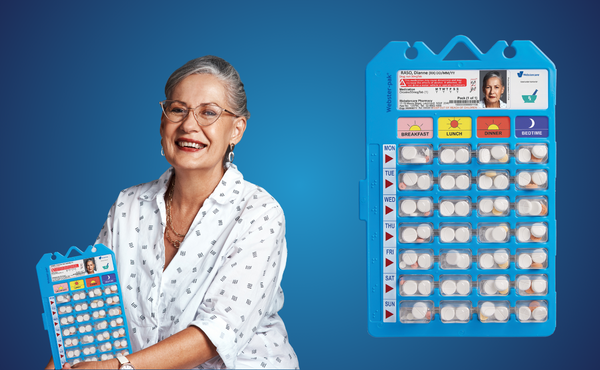One Important Routine to Maintain During the Holiday Period

Did you Catch us on 2GB’s Healthy Living Show?╠ř
December 12, 2022
“Right Medication, Right Dose, at the Right Time” has Never Been so Assured
December 19, 2022The festive season can prove to be a particularly challenging time for medication adherence, however medication expert Gerard Stevens AM says it is one routine that is important to stick to.╠ř
ÔÇťMost routines fly out the window at the end of the year, which is really important in order to relax and have a good time. However, every year millions of Australians suffer adverse medicine events as a result of╠řnot taking medications as prescribed. So it is really important to stick to your medication schedule. However, routine changes and cost pressures during the holiday period can put people at risk,ÔÇŁ said Mr Stevens, who is also Managing Director of╠ř║┌┴¤│ď╣¤═°╠řand an Australian pioneer of medication management for the past 40 years.╠ř
ÔÇťThis is because holidays can be a time when it is easy to lose track of normal daily schedules. There are a lot of disruptions to regular routines, and it can be hard to remember if medication has been taken. Everyone wants to relax and have a good time, but things donÔÇÖt always go according to plan, especially when daily medication routines are interrupted,ÔÇŁ explains Mr Stevens
Simple Steps to Stay Medication Safe:╠ř
What happens if you run out of╠řyour medications or lose them while you are on holidays?╠řMr╠řStevens, who╠řinvented the iconic Webster-pak╠řthat keeps thousands of Australians medication-safe every day,╠řsays╠řa few simple steps can╠řhelp people to stay medication safe while╠řthey╠řare╠řaway from home:╠ř
1. Ask your pharmacist for a ░┬▒▓˙▓§│┘▒░¨-▒Ŕ▓╣░ý┬« for the duration of╠řyour╠řholiday╠řperiod
A Webster-pak will ensure all medications prescribed are available for the duration of the trip and╠řact as a╠řreminder╠řto take╠řthe╠řrecommended doses.╠řThe most widely used blister-pack in Australia is the╠ř░┬▒▓˙▓§│┘▒░¨-▒Ŕ▓╣░ý┬«, which was invented by Mr Stevens more than 35 years ago.╠ř╠ř
ÔÇťWith a Webster-pak╠řsystem, the pharmacy will supply a weekÔÇÖs worth of medication packed into individual dosage times, so you know exactly what needs to be taken at the right time. Your pharmacy may even deliver it for you!ÔÇŁ says Mr Stevens.╠ř
2. Carry a PocketProfileÔäó Medicines List in a wallet or purse╠ř
People can find it difficult to remember and explain exactly what medications and doses they take, especially with multiple medications. One great solution is ║┌┴¤│ď╣¤═°’s PocketProfile Medicines List, which can simply be printed by your pharmacist.╠řIt contains a person’s entire medication profile, including images of medications, and neatly folds down to the size of a credit card, so itÔÇÖs easy to keep in your purse or wallet. Whenever a medication changes, your pharmacist will issue you with an updated╠řPocketProfile.╠ř╠ř
ÔÇťAround one-in-five people aged 70 or older are on four or more medications, which they truly need. It can be difficult to remember all of the names and correct dosages,ÔÇŁ warned Mr Stevens.╠řÔÇťSo╠řhaving an up-to-date╠řlist can be very useful.╠řPlus, in an age where things are increasingly digital, users of the PocketProfile╠řdonÔÇÖt need the latest gadgets, apps and electronic devices ÔÇô it wonÔÇÖt run out of charge and it wonÔÇÖt shut down.ÔÇŁ╠ř
The PocketProfile also contains the person’s home pharmacy and phone number, enabling a pharmacist at a holiday destination to simply ring the home pharmacy to confirm the medications that were prescribed,╠řbefore issuing emergency replacements╠řto last the remainder of the holiday.╠ř
ÔÇťIt is particularly╠řhelpful in emergency situations. Medical staff can immediately see a patient’s medications and any other medical concerns, including╠řÔÇśin case of emergencyÔÇÖ contact details,ÔÇŁ said Mr Stevens.╠ř
3. Speak to your pharmacist before going away.
ÔÇťIt is a good practice to check in with your pharmacist before going away, they are a wealth of knowledge and information,ÔÇŁ says Mr Stevens. ÔÇťIt is also an opportunity to speak to them about the Pharmacist Shared Medicines List,╠ř(PSML) a consolidated list of medicines prepared by a pharmacist and uploaded to a patientÔÇÖs . It can help to reduce medication-related problems, specifically those experienced by older Australians.ÔÇŁ╠ř
Reference:╠ř
- Medication safety in acute care in Australia: where are we now? Part 1 (Review 2002-2008), Aug 2009╠ř
To learn more or to speak to a ║┌┴¤│ď╣¤═° specialist, contact us on 1800 244 358



